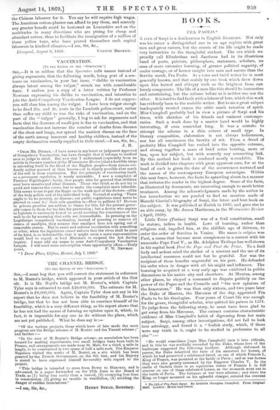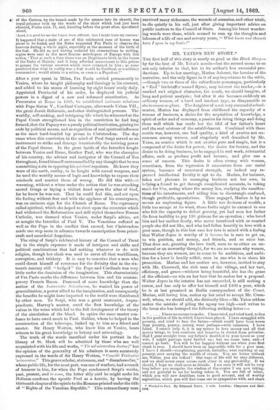BOOKS.
—4— FRA PAOLO.*
A LIFE of Sarpi is a desideratum in English literature. Not only was his career a distinguished one in an age replete with great men and great careers, but the events of his life might be made very instructive to the thoughtful student. The era which we proudly call Elizabethan and Jacobean had in its illustrious band of poets, painters, philosophers, statesmen, scholars, no man of more extensive learning, of greater political sagacity, of cooler courage, or of keener insight into man and nature than the Servite monk, Fra Paolo. As a terse and lucid writer he is most generally known, and that mainly by one book which drew down upon him hatred and obloquy such as the brightest fame can barely compensate. The life of a man like this should be instructive and entertaining, but the volume before us is neither one nor the other. It is hard to find fault with a labour of love, which this work has evidently been to the amiable writer. But to see a great subject inadequately treated causes the critic much vexation of spirit. Miss Campbell probably had in view a picture of Sarpi and his times, with sketches of his friends and eminent contempo- raries. Such a work done by a master hand would be highly interesting, if even somewhat long. It was a mistake to attempt the scheme in a thin octavo of small type. In literary composition, elaboration is not always tediousness, nor has all conciseness the brevity of wit. From a dread of prolixity Miss Campbell has rushed into the opposite extreme, and strung together a mass of brief notes bearing, more or less, upon her subject, but with scarcely any connecting link. By this method her book is rendered nearly unreadable. The work is divided into chapters with great apparent care, for at the head of each is given the date of the occurrences narrated and the names of the contemporary European sovereigns. Within this neat fence, however, the facts lie sprawling about. in a manner that irritates the reader in the highest degree. Some of the facts, as illustrated by documents, are interesting enough to merit better treatment. Among the acknowledgments made by the author in her introduction we are puzzled to find no mention made of Bianchi Giovini's biography of Sarpi, the latest and best book on the subject. It was published at Zurich in 1836, and gave rise to an able essay, by Mr. James Martineau, in the Westminster Review (April, 1838).
Little Peter (Perino) Sarpi was of a frail constitution, small in stature, infirm in health. Love of learning, rather than religious zeal, impelled him, at the childish age of thirteen, to enter the order of Servites in Venice. His name in religion was Paul, a name that became most conspicuous in a contest with his namesake Pope Paul V., as Mr. Adolphus Trollope has well shown in his capital book Paul the Pope and Paul the Friar. To a frail body and ardent mind the shelter of a convent and the use of its intellectual resources could not but be grateful. Nor was the recipient of these benefits ungrateful on his part. He defended his order when in danger with all his might and influence. The learning be acquired at a very early age was exhibited in public discussions in his native city and elsewhere. At Mantua, among other places, he obeyed a command to dispute publicly on the power of the Popes and the Councils and "the new opinions of the Innovators." He was then only sixteen, and two years later the Duke of Mantua, the Mweenas of the day, appointed Fra Paolo to be his theologian. Four years of Court life was enough for the grave, thoughtful scholar, who quitted his patron in 1574. To judge from the following story, he must have been glad to get away from his Mascenas. The extract contains characteristic evidence of Miss Campbell's habit of digressing from her main subject. Sarpi, among other investigations, did not fail to look into astrology, and found it a " foolish study, which, if there were any truth in it, ought to be studied in preference to all else " "He would sometimes [says Miss Campbell] turn it into ridicule, and in this he was cordially seconded by the Duke, whose love of the burlesque suggested the following incident. Although deformed in person, the Duke inherited the taste of his ancestors for horses, of which he had preserved a celebrated breed, on one of which Francis King of France, was mounted at the battle of Pavia ; and as war-horses they were also greatly esteemed by the Emperor Charles V. In the castle of Ombria there is an equestrian statue of Francis I. in full armour on one of these celebrated horses, as the monarch went out to the battle of Pavia. The fortunes of war worn adverse ; and when the King, no longer mounted on his splendid charger, entered the convent • The Lift of Pra Paolo Satpi. By Arabella Georgina Campbell. From Original MSS. London : Molini and Green. of the Certosa, by the breach made by the cannon into its church, the royal prisoner took up the words of the choir which had just been chanted, Psalm cxix. 71, and, kneeling before the great altar, ejaculated aloud,
Lord, it is good for me that I have been afflicted; that I might learn thy statutes.'
It happened that a mule of one of this celebrated race of horses was about to bo foaled, and the Duke requested Fra Paolo to observe the heavens during a whole night, especially at the moment of the birth of the foal. He did so, and having reduced his observations to writing, copies were sent to the most famous astrologers of Europe with this notice, That at such a time there was an illegitimate birth in the house of the Duke of Mantua,' and it long afforded amusement to this prince to peruse the various answers which were returned to him ; as some predicted that what in reality was a foal would bo Cardinal, or a military commander ; would attain to a mitre, or even to a Popedom !"
After a year spent in Milan, Fra Paolo settled permanently in
Venice, where he taught philosophy and theology in his convent, and added to his stores of learning by eight hours' study daily. Appointed Provincial of his order, he displayed his judicial powers in a digest of a new and reformed constitution. As Procurator at Rome in 1585, he established intimate relations
with Pope Sixtus V., Cardinal Castagna, afterwards Urban VII., the great Jesuit Bellarmin, and other distinguished persons. The worldly, self-seeking, and intriguing life which he witnessed at the Papal Court strengthened him in the conviction he had long formed, that the Papacy was a purely political institution, gaining its ends by political means, and as regardless of real spiritual influence as the most hard-headed lay prince in Christendom. The day came when this conviction in the mind of Paul Sarpi served as an instrument to strike and damage irretrievably the reviving power of the Papal throne. In the great battle of the Interdict fought between Venice and Rome, Brother Paul, who was the champion
of his country, the adviser and instigator of the Council of Ten throughout, found himself untrammelled by any thought that he was committing a sin in opposing his spiritual superiors. He knew they were of the earth, earthy, to be fought with carnal weapons, and he used the worldly means of logic and knowledge to expose their
misdeeds and convict them of wrong. He did this without wavering, without a wince under the notion that he was attacking sacred things or laying a violent hand upon the altar of God, for he knew he was not. That he could feel this, and act upon the feeling without fear and with the applause of his countrymen, was an ominous sign for the Church of Rome. The supremacy called spiritual, which she hoped to rivet upon the countries which had withstood the Reformation and still styled themselves Roman Catholic, was doomed when Venice, under Sarpi's advice, set at nought the Interdict of Paul V. The Venetians suffered as well as the Pope in the conflict that ensued, but Christendom made one step more in advance towards emancipation from priest- craft and sacerdotal despotism.
The sting of Sarpi's celebrated history of the Council of Trent lay in the simple exposure it made of intrigues and shifts and political combinations that had nothing whatever to do with
religion, though her cloak was used to cover all that worldliness, corruption, and trickery. It is easy to conceive that a man who could divest himself of reverence for the divinity that in the six- teenth century still " hedged " the Pope and Cardinals was very little under the dominion of the imagination. This characteristic of Fra Paolo marks the difference between him and his contem- porary Francis Bacon. Possessed of more knowledge than the author of the Instauratio Scientiarunt, he wanted his power of generalization, a power allied to the imagination, and consequently the benefits he might have imparted to the world were distributed by other men. To Sztrpi, who was a great anatomist, Acqua-
pendente, Harvey's master, owed the first knowledge of the valves in the veins which led to the full development of the theory of the circulation of the blood. In optics the same master con- fesses to have owed much to Paul. Galileo, whom he helped in the construction of the telescope, looked up to him as a friend and master. Sir Henry Wotton, who knew him at Venice, bears witness to his great knowledge in botany and mineralogy.
The truth of the words inscribed under his portrait in the library of St. Mark will be admitted by those who are well acquainted with his life and works, " Vir ad miraculum doctus ;" but the opinion of the generality of his admirers is more accurately expressed in the words of Sir Henry Wotton, " Concilii Tridentini 'eviscerator." This grave scholar, statesman, and " disemboweller," whose public life, for the most part, was one of warfare, had a smack of humour in him, for when the Pope condemned Sarpi's works, past, present, and to come, the latter slily said he might make his
Holiness condemn the apostle Paul as a heretic, by having the thirteenth chapter of the epistle to the Romans printed under the title
of " Rights of the Venetian Republic." This extraordinary man 1 ismWreeked in Port. survived many sicknesses, the wounds of assassins, and other trials, to die quietly in his cell, just after giving important advice on public matters to the Council of State. Among his latest wander- ing words were these, which seemed to sum up the thoughts and labours of a life of one and seventy years, " What knots and threads have I spun in my brain !"































 Previous page
Previous page